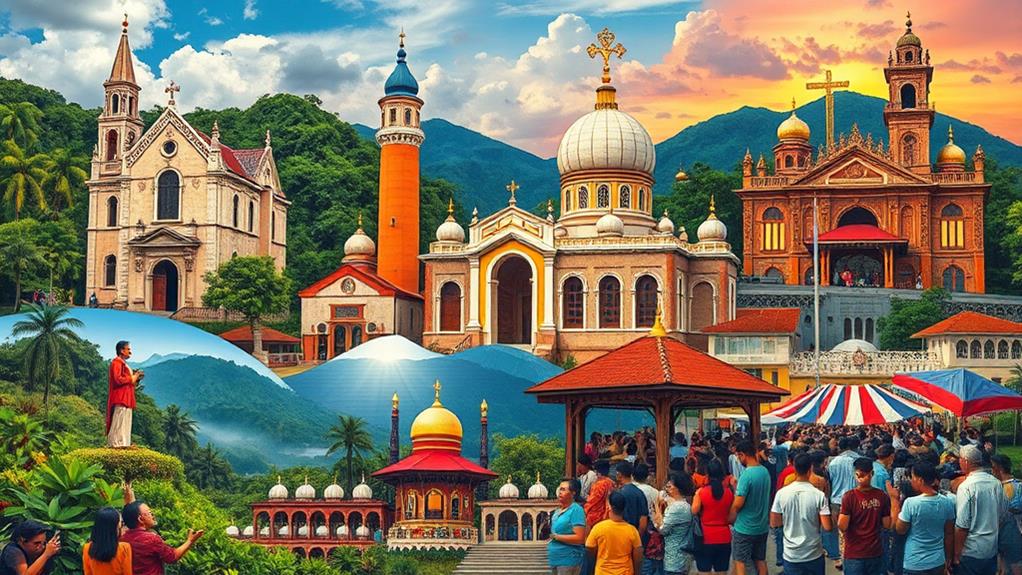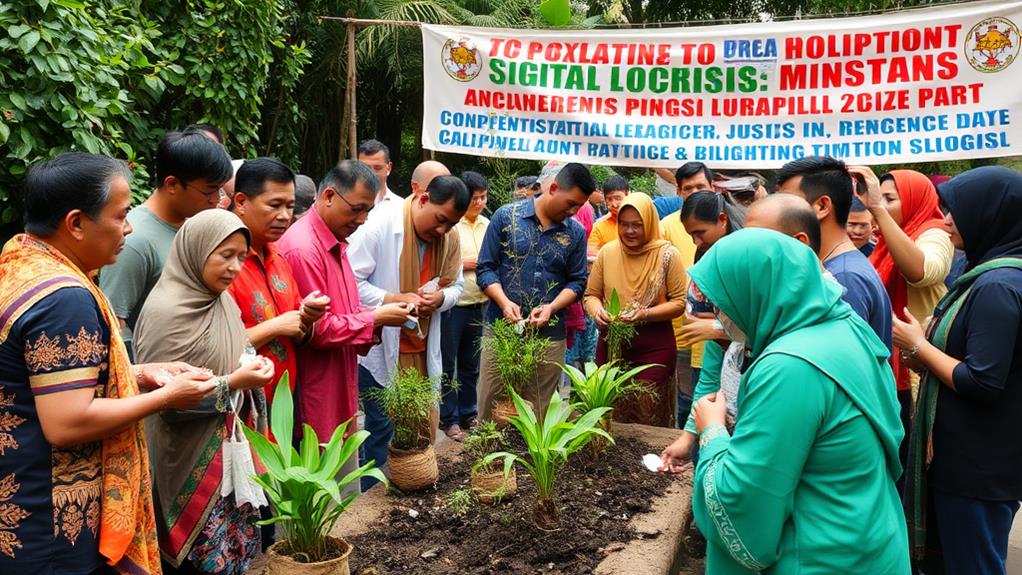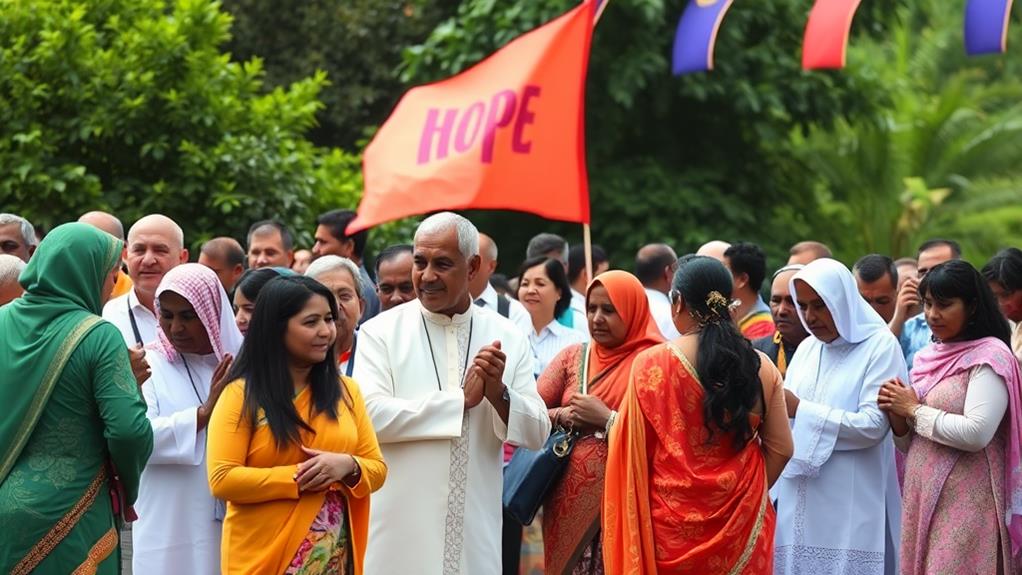Religion plays a vital role in promoting social justice in the Philippines. The country's predominantly Catholic population, along with other faiths, actively engages in initiatives to combat systemic inequalities. Interfaith dialogue and harmony are embraced as means to foster understanding and cooperation among different religious communities. Through collaborative efforts, religious groups in the Philippines advocate for the rights of marginalized sectors, promote peace, and address issues such as poverty and discrimination. This collective commitment to social justice reflects the strong influence of religion in shaping the country’s moral and ethical values.
For instance, interfaith dialogues like the Bishops-Ulama Conference bring together diverse religious groups to advocate for peace and inclusivity. This collaboration is crucial in addressing social injustices.
Despite these efforts, challenges persist. The Muslim community, in particular, faces discrimination and underrepresentation.
To address these issues, recent legislative measures, such as the proposed Magna Carta for religious freedom, aim to protect rights. These efforts demonstrate the collective commitment of faith groups to not only address immediate needs but also strive to dismantle barriers to equality.
Overview of Religious Demographics

Religious Demographics in the Philippines
The Philippines is a culturally diverse nation with a rich tapestry of belief systems, shaping its social dynamics and culture. 79.5% of the population, or around 91 million people, identify as Roman Catholic, making it the largest religious group in the country.
Christian Denominations and Islam
Approximately 9% of the population, or around 10.3 million people, adhere to various Christian denominations. The Muslim population constitutes around 6% of the population, or approximately 6.8 million people, with estimates suggesting it could be as high as 10-11%.
Most Muslims reside in Mindanao, where Sunni Islam predominates, alongside a small Shia minority and indigenous groups practicing Islam.
Other Religious Groups
The Iglesia ni Cristo, the largest non-Catholic religious group, has around 2.8 million members, accounting for approximately 2.6% of the population.
Additionally, around 8.2% of the population reports affiliations with other religions, indicating a diversification of beliefs beyond traditional Catholicism and Christianity.
Impact on Social Justice
This diversity of religious demographics impacts social justice initiatives within the country, as various groups advocate for their rights and representation.
Understanding these dynamics is crucial for addressing the challenges faced by religious minorities and fostering a more inclusive society.
Legal Protections for Religious Freedom
Legal Protections for Religious Freedom in the Philippines
The Constitution of the Philippines guarantees the free exercise of religion and prohibits the establishment of a state religion, ensuring the separation of church and state. This principle allows organized religious groups to operate without governmental interference.
To enjoy tax-exempt status, these groups must register with the Securities and Exchange Commission and the Bureau of Internal Revenue, with reviews every three years to ensure compliance.
Concerns Over Recent Legislation
Recent legislation, such as the Antiterrorism Act of 2020, has raised concerns about its implications for religious freedoms. Although the Supreme Court upheld the Act, its constitutionality is being challenged through 37 petitions, reflecting public anxiety over potential overreach affecting religious practices.
Protection of Religious Gatherings
Public officials are legally barred from interrupting worship services or offending religious feelings, emphasizing the government's commitment to protect religious gatherings.
For instance, the government ensures that religious groups can conduct their activities without fear of interference or persecution.
Strengthening Legal Protections
The proposed Magna Carta of Religious Freedom Act aims to enhance legal protections for religious freedom. Having passed in the House in 2023, this legislation demonstrates the government's ongoing effort to uphold and strengthen legal protections for religious freedom in the Philippines.
The government is committed to protecting religious freedom and ensuring that religious groups can operate without interference.
Social Justice Initiatives by Faith Communities

Faith communities in the Philippines, particularly the Catholic Church, have taken a proactive stance in addressing social justice issues. The National Council of Churches in the Philippines (NCCP) collaborates with various organizations to push for legislative reforms and support community service efforts.
To tackle social justice issues, faith communities have initiated several key projects. Youth-led organizations are harnessing social media to raise awareness about social justice issues, with 85% of Filipino teens eager to make a difference. This effort is crucial in engaging the younger generation in advocating for social change.
Another initiative is interfaith dialogue, such as the Bishops-Ulama Conference, which focuses on fostering peace and understanding among diverse religious groups to tackle systemic injustices. This dialogue aims to promote unity and collective action in addressing social justice issues.
Catholic universities are engaging students in activism and community service, shaping future leaders committed to social advocacy. This effort is essential in developing a new generation of leaders who are dedicated to creating positive change.
These initiatives reflect a collective commitment to creating meaningful change. By fostering collaboration and dialogue, faith communities not only address immediate needs but also work toward dismantling the roots of inequality, empowering individuals, and promoting a more just society.
Challenges in Religious Discrimination
Religious discrimination is a significant challenge in the Philippines, particularly affecting the Muslim community. Systemic biases are evident in various ways, especially within government offices. For example, a Muslim woman was recently asked to remove her hijab for a National ID photo, highlighting the deep-rooted prejudice faced by Muslim Filipinos.
Derogatory comments on social media contribute to a hostile climate. Reports of online harassment make it difficult for individuals to express their beliefs freely. This creates an environment where Muslim Filipinos are reluctant to openly practice their religion.
The Muslim community is severely underrepresented in senior government and military positions. There's only one Muslim cabinet member, raising concerns about the government's ability to address the unique needs of Muslim Filipinos.
Although the National Commission for Muslim Filipinos (NCMF) works to protect Muslim rights, enforcing these rights remains challenging due to pervasive societal discrimination and prejudice.
Discrimination extends into education and employment. Muslim individuals frequently encounter barriers that limit their access to opportunities. For instance, some Muslim students are discouraged from wearing their hijabs in schools, while Muslim job applicants face biases during the hiring process.
This ongoing struggle emphasizes the urgent need for awareness and action to combat religious discrimination and promote social justice in the Philippines.
How Does Religion Influence Social Justice in the Philippines?
Religion plays a significant role in shaping the social justice landscape in the Philippines. The impact of religion on filipino values has created a strong foundation for promoting equality, compassion, and community support. Through religious teachings and traditions, Filipinos are often motivated to advocate for fairness and empathy towards marginalized groups in society.
Interfaith Collaboration for Social Change

Addressing Social Injustice in the Philippines Requires Interfaith Collaboration
To tackle the pervasive issues of discrimination and social injustice in the Philippines, a unified approach that transcends individual faiths is necessary.
Interfaith collaboration is essential for fostering social change, particularly in areas like the Bangsamoro Autonomous Region, where Christian-Muslim collaboration is vital for peace and development.
Key Initiatives for Interfaith Collaboration
The Bishops-Ulama Conference promotes interfaith dialogue among religious leaders to tackle social issues.
Community empowerment projects, led by organizations like the National Council of Churches in the Philippines and the National Commission for Muslim Filipinos, focus on poverty alleviation and education.
Youth-led initiatives engage young Filipinos in discussions on social justice, utilizing social media to advocate for change.
Benefits of Interfaith Collaboration
Interfaith collaboration enhances religious tolerance and creates a collective voice for marginalized communities.
By working together, different faith groups can address pressing societal issues, such as human rights and civil liberties.
Engaging in interfaith dialogue strengthens community ties and encourages a sense of shared responsibility.
Fostering collaboration across faiths is crucial for achieving lasting social change in the Philippines.
Government Engagement and Policies
Government Engagement Shapes Social Justice and Religious Freedoms
In the Philippines, government policies and engagement significantly influence the landscape of social justice and religious freedoms. The Constitution guarantees the free exercise of religion, ensuring a secular state that respects diverse beliefs.
Concerns Over the Antiterrorism Act
However, the Antiterrorism Act of 2020 has sparked concerns among religious communities about its potential misuse against advocates for social justice and human rights.
This highlights the need for vigilant oversight and dialogue to prevent any misuse.
Efforts to Address Anti-Muslim Discrimination
The National Commission for Muslim Filipinos (NCMF) actively addresses anti-Muslim discrimination, advocating for rights such as the right to wear hijabs in identification photos.
Additionally, the Department of Education's ALIVE program supports over 173,641 Muslim students, integrating religious education into the curriculum and allowing madrassahs to access financial assistance.
Interfaith Dialogue Initiatives
Interfaith dialogue initiatives, often backed by the U.S. embassy, foster cooperation among various religious groups, aiming to tackle social justice issues and promote peace, particularly in conflict-affected areas like Mindanao.
This multifaceted approach emphasizes the importance of effective government engagement in achieving social justice and protecting religious freedoms in the Philippines.
Questions and Answers
How Does Religion Affect the Philippine Society or Culture?
Religion plays a significant role in shaping Philippine society and culture. It influences cultural identity by infusing moral values into daily life, making it a vital part of the country's social fabric. For instance, the Catholic Church's teachings on family and marriage have contributed to the strong family bonds and close-knit communities in the Philippines.
Community engagement in the Philippines is often rooted in religious gatherings. These gatherings foster social norms that guide behavior, such as the importance of respect for elders and authority figures. The Philippines' religious diversity, which includes Catholicism, Islam, Protestantism, and indigenous beliefs, enriches the cultural landscape.
Spiritual leadership plays a crucial role in addressing societal issues. Religious leaders often speak out on important social concerns, such as poverty, corruption, and human rights. For example, the Catholic Bishops' Conference of the Philippines has been vocal about issues like extrajudicial killings and the need for social justice.
Ritual significance in ceremonies enhances connections among Filipinos. Religious ceremonies, such as the Simbang Gabi (Night Mass) during the Christmas season, bring people together and strengthen community bonds.
Religious education deepens understanding of these interwoven aspects of life. It provides a moral framework for Filipinos to make informed decisions and navigate the complexities of modern life.
How Is Religion Connected to Social Justice?
Religion is connected to social justice through faith activism, where individuals use their beliefs to address societal issues. For instance, many religious teachings emphasize the importance of helping the poor and vulnerable, leading to community engagement and poverty alleviation efforts.
Ethical leadership emerges from spiritual guidance, prompting action on human rights and empowerment initiatives.
Additionally, interfaith dialogue fosters collaboration among diverse groups, enhancing understanding and support for social equity. This dialogue enables people from different religious backgrounds to work together towards a common goal of promoting social justice.
Collaborative efforts create a framework for addressing injustices and promoting a more equitable society.
What Is the Social Justice System in the Philippines?
The social justice system in the Philippines aims to promote fairness and equality through a legal framework.
This framework focuses on poverty alleviation by addressing the root causes of poverty, such as lack of access to education, healthcare, and job opportunities. It also prioritizes human rights, ensuring that every individual is treated with dignity and respect, regardless of their social status, gender, or ethnicity.
Grassroots movements play a crucial role in pushing for policy reforms. These movements advocate for access to justice, making sure that everyone, especially the marginalized, has a voice in the legal system. They also work to tackle institutional bias, identifying and addressing discrimination within institutions and systems.
Economic disparity remains a significant challenge. Despite efforts to address poverty, the wealth gap between the rich and the poor persists.
Community engagement is essential for progress, as it allows citizens to participate in decision-making processes and hold institutions accountable.
Initiatives exist to support marginalized groups, such as programs for indigenous peoples, persons with disabilities, and women.
However, ongoing efforts are needed to ensure that all citizens benefit from social justice measures. This requires continued advocacy, community engagement, and policy reforms to address the root causes of inequality.
What Are the Problems Encountered by Religion Now in the Philippines?
Religious intolerance is a significant issue in the Philippines, often leading to sectarian violence and conflict. For instance, the ongoing conflict between Muslim separatist groups and the Philippine government has resulted in the displacement of thousands of people and numerous deaths.
Corruption within religious institutions undermines faith-based activism and poverty alleviation efforts. Many Filipinos have lost trust in religious leaders due to corruption scandals, such as the misuse of church funds and the involvement of clergy in illegal activities.
The moral authority of religious institutions is challenged by the need for genuine interfaith dialogue. The lack of communication and cooperation between different religious groups has led to misunderstandings and tensions, hindering efforts to address social issues.
The church's influence on youth engagement is waning, impacting community outreach and social programs. Many young Filipinos are becoming disenchanted with organized religion, leading to a decline in church attendance and participation in religious activities.
Collaboration across faiths is crucial for fostering harmony and addressing social issues. By working together, religious groups can pool their resources and expertise to tackle pressing problems, such as poverty, education, and healthcare.